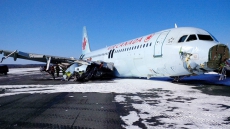OTTAWA — The Harper government has issued a long-awaited call for tenders to replace Canada's aging fixed-wing search planes, more than a decade after the project was first proposed.
The Public Works secretariat overseeing the program is asking the defence industry not only for aircraft, but also a capability-based solution, which means would-be contractors can propose details such as where the planes should be based.
The federal government also wants contractors to include 20 years of in-service support and maintenance in their proposal.
The air force is looking to replace six C-115 Buffalo transports, which are more than 50 years old, and 13 older C-130 Hercules, which have been the backbone of Canada's rescue response, particularly in the Arctic.
The delayed effort to replace the planes has been a procurement black eye for the Conservatives, especially since the program was declared "a top priority" by former defence minister Peter MacKay in 2008.
Federal budget documents suggest the government doesn't anticipate receiving new aircraft until 2018, and National Defence's own acquisition says that time frame could be pushed to 2021 — or 17 years after the program was initially proposed.
Under the Liberals, the program was pegged at $1.3 billion, but government documents suggest it's now more than $1.5 billion.
It's expected there will be only three companies bidding — Alenia Aermacchi with the C-27J Spartan; Airbus Military with the C-295 and Lockheed Martin's C-130J.
The program was initially knocked off track after the air force was accused of rigging the specifications to eliminate all competitors, except for the Italian-built C-27J.
Protests from industry were so loud that MacKay ordered the National Research Council to review the plan, and it reported back that the military's specifications were far too narrow and needed to be broadened in order to ensure competition.
What followed the 2009 report was years of industry consultations.
Despite the backlash to the original proposal, the air force last year continued to pitch the C-27J, telling the government that 17 surplus U.S. aircraft represented "a unique, time-sensitive investment opportunity" for Canada.
Internal documents showed military planners pitched the notion of acquiring those transports that were being sold by the Pentagon three years ago as part of a massive budget-cutting exercise south of the border.




